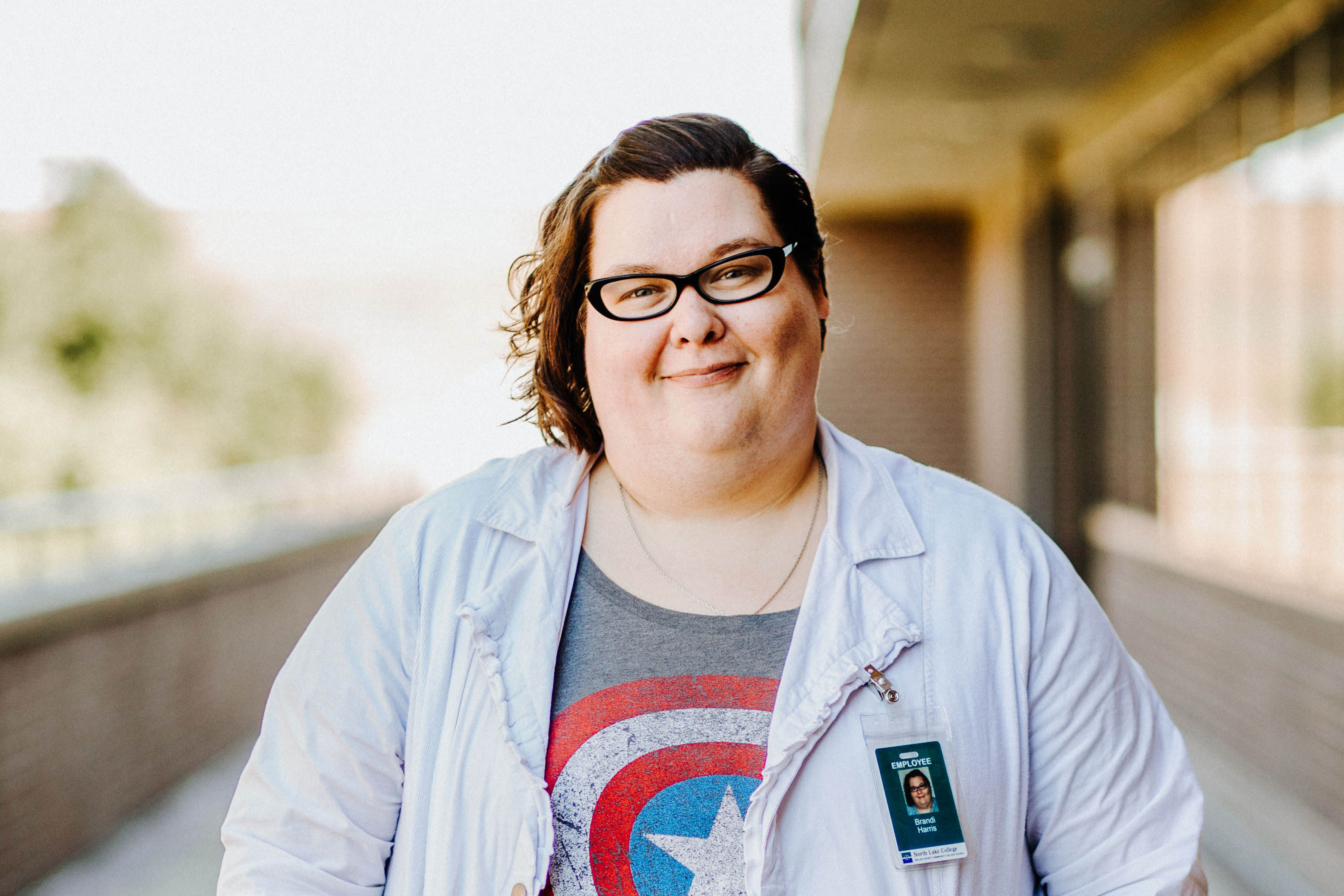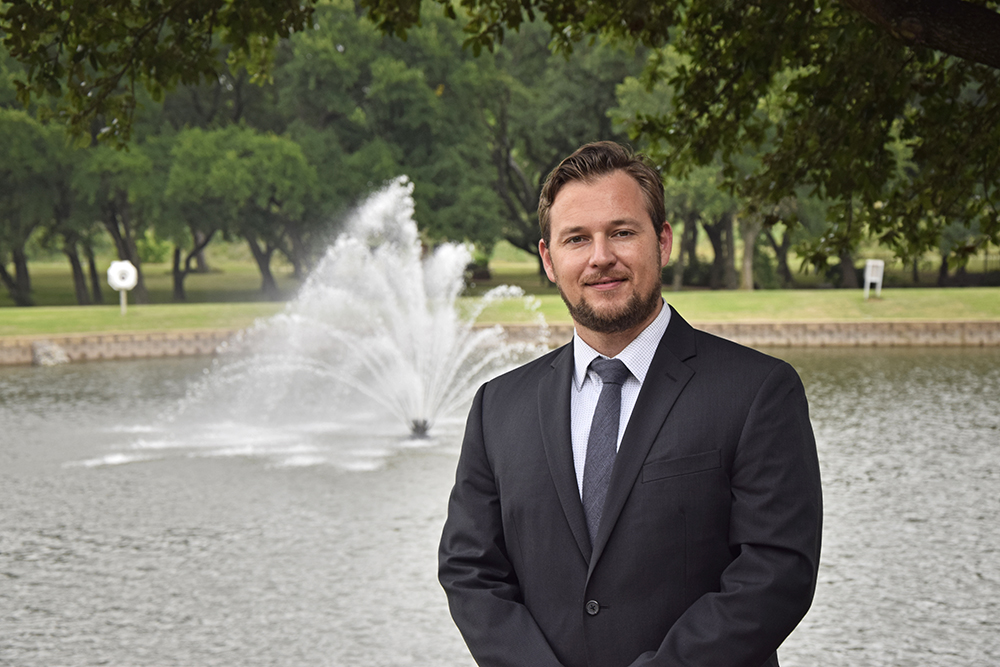 “27 years, six months, 19 days, and about two hours.” Skip Ragler recounts his military service with the calm precision that he brings to all his work. As North Lake College’s coordinator of Veterans Affairs, Ragler helps provide the support veterans need to find academic success. And, after a successful career in uniform, he remains humble, thankful, and driven to help others achieve their own goals.
“27 years, six months, 19 days, and about two hours.” Skip Ragler recounts his military service with the calm precision that he brings to all his work. As North Lake College’s coordinator of Veterans Affairs, Ragler helps provide the support veterans need to find academic success. And, after a successful career in uniform, he remains humble, thankful, and driven to help others achieve their own goals.
What have you done for NLC today?
Skip Ragler is not a man who brags. “I shy away from the titles,” he says, but a look at his resume shows he’s had quite a few: Lieutenant Colonel Ragler in the US Army, Professor Ragler at the University of Texas at El Paso, and most recently Dr. Ragler, after completing his Ed.D. Now he admits that he just wants to be called “Skip.”
For the Army, Ragler served as a systems engineer in the Signal Corps—“kind of the AT&T of the Army,” he explains—and served as deputy commander of a training brigade of five thousand recruits from the United States and other countries. Ragler has also taught military science and worked on data analysis in the civilian world.
His Army background manifests at NLC in his rigorous work ethic and leadership habits. “On the way to work,” Ragler explains, “I think, what do I need to do? Can I do it better? On my drive home, I think, what have I done today, and did I do it well? And that’s from the military: ‘what have you done for the Army today?’”
Leading by example
That work ethic also leads Ragler to prioritize even the most ordinary day at work. “Don’t assume ‘typical’ is not important,” he advises. “A typical day is service, and service is extremely important.” The services Veterans Affairs provides are varied: academic help, advising, collaborations with financial aid. “But sometimes it’s personal,” Ragler adds. “Sometimes we have veterans who need someone to talk to.”
Empathy is, therefore, an important part of the job. “Often conversations are very personal,” Ragler admits. “They confide in me because as a vet, they know I understand.” And as a former community college student from a modest upbringing, he can relate to them. “Most veterans you can convince that they can be successful academically. But there are some who question that they can do that. I use myself as an example with them.”
One day, driving home, Ragler thought about a student who had come in asking for advice. He thought the meeting had been useful, but that he hadn’t made it clear to the student that his door was always open.
“So I called him back to the office,” Ragler recalls. “In the Army, if you get summoned to the office, you think you’re in trouble.” Instead he told the student that the fault was Ragler’s own, and that he wanted to emphasize an important message: “If you need help, please come back in. “ He adds, “They always come back if you say that.”
 A mentor to minority men
A mentor to minority men
Skip Ragler has another duty at North Lake: professor. He is part of AIMM (Academically Influencing Minority Males), a program that pairs minority male students with faculty mentors and offers them close guidance throughout their academic career.
Ragler calls his students “my gentlemen” and takes his leadership of them seriously. He teaches an evening session in which nearly every student works during the day. “Because of that, I structure it differently: it’s life mentoring and coaching. The academic side is important, but things like finance, budget—guys come in who don’t know how financial aid works.”
So Skip doesn’t stop at teaching lessons. He also educates students on how to get financial aid, and helps those without home computers print off assignments for their other classes. On “Tie Tuesday,” Ragler’s students prepare for job hunting with lessons on how to dress for the workplace. He even persuaded Burlington Coat Factory to donate ties for students who didn’t own any.
Hard work and help
What drives Skip Ragler to shrug off his titles and serve his students? He credits a Southern Baptist upbringing and his family’s example. His father always taught Skip and his five siblings to do the right thing and push themselves to be better. “I think anyone that’s accomplished anything,” Ragler says now, “has an obligation to help someone accomplish something. It doesn’t have to be what you did—but something.”
“I like encouraging people to do more,” he adds. “If you’re making all B’s, keep pushing. If you’re getting an associate’s degree, keep going.” Skip Ragler credits his own success to “hard work and help,” and with the student veterans he serves at North Lake, he tries to provide the help and instill the hard work.







I’m very proud of you.
I just saw this and since I have been informed that, like your comment, my reply will be public, I’ll just say Thanks!
While visiting our new site, I saw and read this great article. Thank you for your service and your dedication to our NLC students. It is a pleasure working with you.
Love this article Skip! I value your contribution to the team.
Skip is truly a consummate professional and scholar who takes service to others very serious. With so much media coverage on the challenges and ills in our society, it is refreshing to see a well deserving article on someone I have witnessed going over and beyond the call of duty. He is an excellent mentor to, not only his students, but also his staff. He demonstrates great compassion for his students and works diligently to see them succeed.
Kudos Dr. Ragler!!! I am grateful to have had the opportunity to work under your leadership!
[…] by Lt. Col. Skip Ragler (ret.), the Vet Center prides itself on service. Doors are always open, and the advisor team helps […]
I am pretty sure that I read this great article on you Skip when it first came out, but then I read it with new eyes when it was showcased on the new website. Wow- I learned more about your passion for service and background. Glad to call you my colleague and I appreciate all you bring and contribute to North Lake.
A true servant leader who quietly supports our veterans and our students. Your strength is what people see first but it’s your heart and compassion that really speaks to your character. As a said many times, please tell your mother what an amazing job she did raising such a fine and generous man. Thank you Skip, for your service to our country and to NLC.